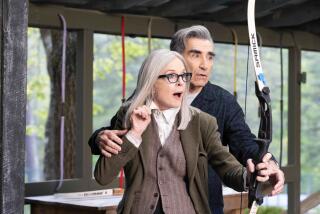Hammer Experimental Films at Wallenboyd
- Share via
Filmforum will screen at the Wallenboyd tonight at 8 the vibrant and challenging experimental films of Barbara Hammer. In such works as “Pools” (1981), in which Hammer finds an exotic, sensual beauty in the kitsch plunges of San Simeon, and “Pond and Waterfall” (1982), in which we journey from a small lake past a cascade and finally to the ocean, Hammer displays a highly sensual communion with nature. At the same time she likes to reconstitute images through various techniques, resulting in short films of stroboscopic intensity such as “Optic Nerve” (1985) and “Parisian Blinds.” These two impulses meld exhilaratingly in her longest, most ambitious film in the program, “Bent Time” (1984), in which she attempts to render visually the scientific theory that time, like light rays, curves at the outer edges of the universe. The result is a “Koyaanisquatsi”-like collage of American urban and rural landscapes shot in extreme wide angle--and without the earlier film’s pessimistic view of a world out of harmony with nature. Hammer will appear in person and also present her new work, “Snow Job: The Media Hysteria of AIDS.” For more information: (714) 628-7331.
The Nuart’s Monday evening Buster Keaton series continues tonight with “The Three Ages” (1923), his first feature, and “Go West” (1925). The first, a durably amusing, very loose parody of D.W. Griffith’s “Intolerance,” intercuts boy-loves-girl stories in the caveman era, the Roman Empire and the present. In each, the slight, somber but dogged Keaton pursues pretty Margaret Leahy despite the formidable presence of burly Wallace Beery, who wants the lady himself. It’s an instance of David taking on Goliath with similar results. All of Keaton’s films find humor in the sheer malevolent absurdity of the universe, and in the first few minutes of “Go West” he sets up his predicament with breathtaking economy and pure hilarity. Down and out in a small Indiana town, Buster, attempting to heed the advice of Horace Greeley, sells all his worldly goods to the owner of a general store for $1.65--only to discover the greedy merchant insists Keaton has to buy back the meager possessions he’s left in his chest of drawers! After he’s purchased a salami and a loaf of French bread, he’s left contemplating a penny in his palm--which a pretty girl promptly snatches, assuming his offering for a charity. Once out on the range, “Go West” tends to meander as Buster tries to becomes a cowboy, but the film regains momentum for a funny conclusion which features a cattle stampede in downtown Los Angeles. (213) 478-6379, 479-5269.
The Jew in History and Legend series continues Saturday at 7:30 p.m. at the Westside Jewish Community Center with the screening of the rarely seen and quite remarkable 1925 silent, “His People,” directed by Edward Sloman, a fine craftsman skilled with actors but virtually forgotten until he was rediscovered by film historian and preservationist Kevin Brownlow. Adapted from a story by Isadore Bernstein, “His People” is one of the few Hollywood movies to deal with the American Jewish experience, which the mainly Jewish founding fathers of the motion picture industry tended to avoid. It’s a simplistic, heart-tugging melodrama, but its honest emotional intensity and painstakingly authentic rendering of life on Manhattan Lower East Side gives it an enduring impact. Rudolph Schildkraut and Rosa Rosanova are a typical Old Country couple--he’s a scholar reduced to a pushcart peddler--who sacrifice mightily for their two sons (George Lewis and Arthur Lubin), both of whom the father misjudges.
As sentimental as “His People” is, it is forthright about the ruthlessly All-American drive for success, and the eternal gap that grows between immigrant parents and their thoroughly American offspring.
Robert Israel will accompany “His People” on the piano; also on the bill: “The Cowboy,” a 10-minute, Yiddish-dubbed condensation of a 1932 Bob Steele western, “A Son of Oklahoma.” Next program (Feb. 20): D.W. Griffith’s “Judith of Bethulia” (1913), starring Blanche Sweet.
More to Read
Only good movies
Get the Indie Focus newsletter, Mark Olsen's weekly guide to the world of cinema.
You may occasionally receive promotional content from the Los Angeles Times.









